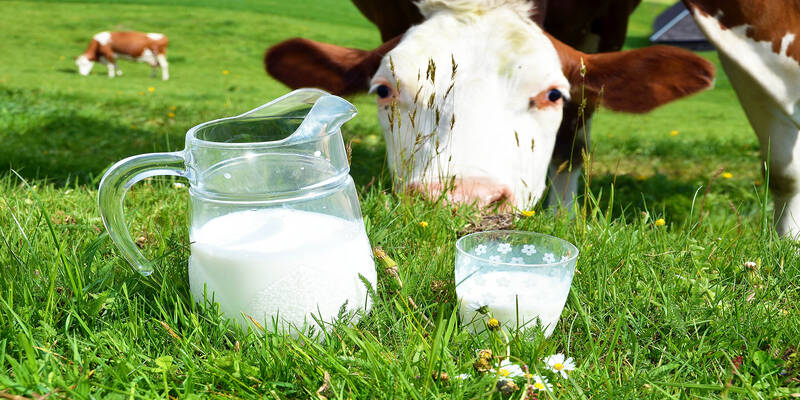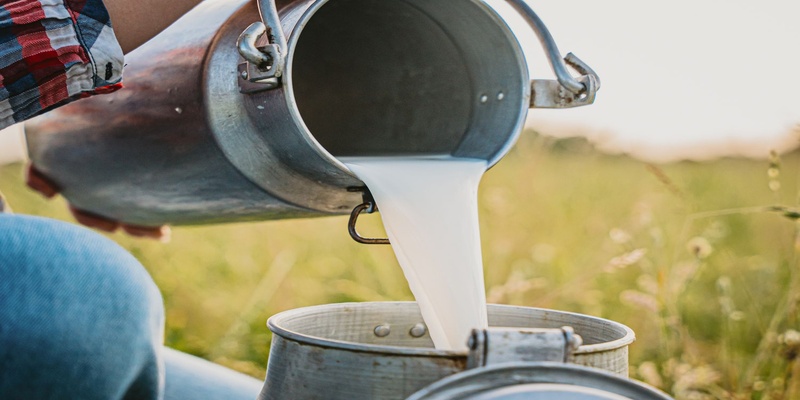Drinking raw milk may be trendy, but no, its not safe. The raw food movement is gaining ground, and it's starting to appear all over social media in food and wellness categories.
Eating raw, uncooked foods is the most widely adopted variation of the raw food diet, and, interestingly enough, unpasteurized milk has also become part of the mix.
We're here to set the record straight and dispel the myth, often spread by internet "experts," that consuming raw milk is somehow healthier than pasteurized milk.
The nutrients in pasteurized milk are virtually identical to those in raw, unpasteurized milk. That includes the well-established health benefits of milk, which promote heart, brain, and bone health.
The question arises: Is it safe to consume raw milk, especially considering it hasn't been pasteurized to eliminate potentially dangerous bacteria?
Before jumping on the raw milk bandwagon, here are some things to consider!

Raw milk benefits include the fact that it is milk that has not been homogenized or pasteurized. While it mostly comes from cows, it can also come from sheep, goats, buffaloes, or camels.
Raw milk can be used to make many dairy products, including cheese, yogurt, and ice cream. However, only about 1% of Americans regularly consume it.
So, can you drink raw milk? Since raw milk from cows, goats, or sheep isn't pasteurized, it presents an equal risk across the board. After digging into the world of raw milk enthusiasts online, multiple people claim that drinking raw milk is good for health.
However, the reality is essential to acknowledge. The FDA warns that testing alone is not a silver bullet for ensuring safety. Some pathogens can't be thoroughly tested, and tests often miss contaminants at low levels.
Importantly, pasteurization kills the bacteria that cause food poisoning without significantly reducing the nutritional value of milk.

Raw milk advocates argue it's a more complete and natural food, offering more fatty acids, vitamins, and amino acids than pasteurized milk. They claim it helps with asthma, autoimmune disorders, allergies, and lactose intolerance.
Some go so far as to suggest that pasteurization is a relic of the past, no longer necessary since many harmful bacteria, like tuberculosis, are less of a concern today.
However, the question remains: Is it safe to drink raw milk? Research paints a different picture. Most of these claims are not supported by scientific evidence, and pasteurization continues to be a critical safety measure.
In today's digital age, misinformation can spread like wildfire; myths about raw milk are no exception. Let's take a look at some of the most common myths about raw milk:
The truth is that both pasteurized and raw milk contain milk protein that can trigger allergic reactions. Likewise, both types of milk contain lactose, and those who are lactose intolerant don't produce enough of the enzyme that breaks it down. There is no magic bullet hereraw milk isn't a cure.
There is no scientific proof to back up these claims. In fact, consuming raw milk can lead to serious health risks, particularly for children whose immune systems are more vulnerable. Instead of boosting immunity, raw milk can put children at risk for dangerous infections.
While raw milk has been consumed throughout history, it's also been associated with outbreaks of diseases like scarlet fever and tuberculosis.
Raw milk has historically been linked to infant deaths, which led to the development of pasteurization. History speaks volumes, and pasteurization has saved lives by preventing milk-borne diseases.
In many underdeveloped nations where pasteurization isn't accessible, raw milk is often heated before consumption to prevent illness.
At this point, you may be wondering what pasteurization is. It is the process that keeps milk and dairy products safe for consumption. Proponents of raw milk claim it has more nutrients, enzymes, and beneficial bacteria than pasteurized milk.
However, pasteurization doesn't throw the baby out with the bathwater regarding nutrients. The process only targets harmful bacteria while keeping essential nutrients like vitamin A, calcium, and protein intact.
All this time, pasteurization is considered a lifesaving innovation, preventing illnesses like tuberculosis, typhoid fever, and listeria. It's a crucial public health measure that has saved countless lives worldwide.
So, what qualifies as pasteurized milk? Milk is pasteurized by heating it for just 30 seconds at 160F (70.5C). According to experts, this wipes out all germs.
In the U.S., most milk and dairy products are pasteurized, but some soft cheeses, yogurt, and certain cream products may still be made with raw milk.
When buying products at farmer's markets or farm stands, look before you leap and double-check that the label reads "pasteurized." If it doesn't, raw milk might be lurking inside.

The risks of drinking unpasteurized milk disease vary from person to person. For healthy individuals, symptoms of infectionsuch as vomiting, diarrhea, and flu-like symptomstypically resolve quickly.
But for others, especially young children, older people, and those with weakened immune systems, the consequences can be severe and even life-threatening.
Don't let your guard downif you or someone in your family becomes ill after consuming raw milk, it's crucial to seek medical attention immediately.
In conclusion, drinking raw milk may be trendy, but its not safe. Since raw milk hasn't been pasteurized to eliminate harmful bacteria, it's not safe to consume.
The FDA advises consumers to stick with pasteurized milk to reduce their risk of serious foodborne illnesses and other health issues.
If you or your family experience symptoms after consuming raw milk, contact your healthcare provider right away. When it comes to your health, it's always wise to play it safe.

By Verna Wesley/Sep 03, 2024

By Mason Garvey/Oct 13, 2024

By Vicky Louisa/Sep 04, 2024

By Maurice Oliver/Aug 29, 2024

By Gabrielle Bennett /Oct 22, 2024

By Elva Flynn/Sep 04, 2024

By Kristina Cappetta/Sep 04, 2024

By Alison Perry/Sep 04, 2024

By Gabrielle Bennett /Sep 04, 2024

By Susan Kelly/Aug 29, 2024

By Juliana Daniel/Sep 03, 2024

By Kelly Walker/Jun 14, 2024